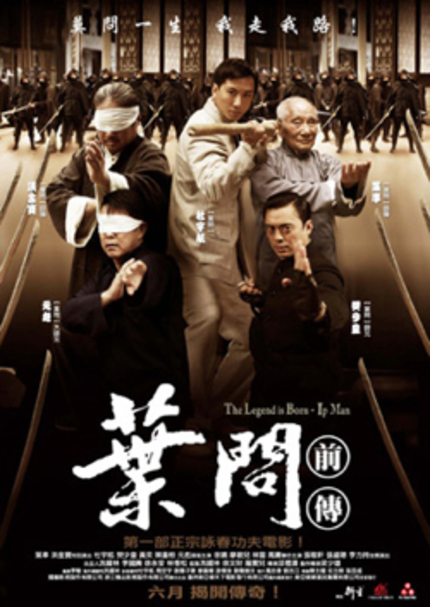THE LEGEND IS BORN - IP MAN Review

Thanks in
large part to the success of the Wilson Yip/Donnie Yen films, this prequel
makes its way to the screen, helmed by prolific schlockmeister Herman Yau and
with the full blessing of Ip Man's own son, Ip Chun, who also makes a memorable
appearance as one of the wing chun master's mentors.
Beginning in 1905 the film charts Ip Man's (To Yu Hang) formative years as he enrolls in Master Wah Shun's (Sammo Hung) wing chun academy, along with his adopted brother Tin Chi (Fan Siu Wong). There they meet Mei Wai (first played by CJ7's Xu Jiao, then later by Rose Chan) and the three form a tumultuous love triangle that over time will see Mei Wai's love for Ip Man go largely unrequited while she is wooed by Tin Chi. After an all too brief cameo, Sammo's character dies, and the school is taken over by Brother Chung So (Yuen Biao), who is eager to preserve the purity of authentic wing chun. He despairs when Ip Man returns to Foshan from Hong Kong (where he encounters a sub-Twister moronically racist expat) displaying all-new moves acquired by an elderly but highly proficient herbalist named Leung Bik (the 86-year-old Ip Chun, who also serves as a consultant on the film).
As the Japanese slowly encroach on the daily lives of our heroes, Ip Man also begins his relationship with Wing Shing (Huang Yi), daughter of Foshan's deputy mayor (Lam Suet) and the plot evenly divides its time between romance, historical pre-war drama and martial arts action. There are plenty of opportunities for the numerous supporting actors to show off their skills and Sammo Hung, Yuen Biao, Fan Siu Wong, Ip Chun and even Bernice Liu (as a Japanese heavy) all get their moment in the spotlight - with Ip Chun's pharmacy sparring match emerging as a personal favourite.
While Yau's film may lack the lavish production values of Wilson Yip's "official" Ip Man films, it does a fairly decent job of emulating a similar mood and aesthetic throughout. Like those films, THE LEGEND IS BORN also loses the plot slightly in its final third, where historical accuracy takes a backseat in favour of a full-on action movie finale, complete with betrayals, reveals, kidnappings and damsels in distress that would be more at home in a campy superhero flick than what was earlier purported to be a straight-up period biopic.
There are
no real standout performances in the film. To Yu Hang is rather uncharismatic
as Ip Man, and the supporting cast is equally low key, but nobody jars or feels
out of place and their genuine martial arts proficiency more than makes up for the lack of thespian showmanship. While there is nothing in this
film that cannot be found, or perhaps seen better executed, in any other recent
Ip Man movie, Herman Yau delivers a far more competent slice of fight-infused
drama than was expected, and can sit more than comfortably alongside its
contemporaries.
Cross published in bc Magazine (Hong Kong)







